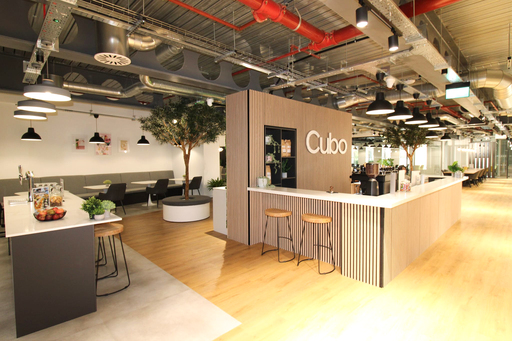Record-breaking Q1 for Derby flex office space provider
Harvey Hadden adds major solar upgrade to cut energy costs and emissions
Harvey Hadden Sports Village in Nottingham has completed the third phase of a long-term solar power rollout, bringing its total installed capacity to 571.5 kWp. The latest upgrade includes a 307.58 kWp rooftop photovoltaic system comprising 676 bifacial solar panels covering more than 1,300 square metres.
The project, supported by over £449,000 in funding from Salix Finance, is part of Nottingham City Council’s wider carbon reduction strategy. With all three solar phases combined, the site now generates over 500,000 kWh of electricity annually.
Launched in 2015, the initiative began with the UK’s largest solar carport, followed by a 200 kWp rooftop system in 2018. The new installation is projected to deliver around 257,752 kWh annually, cutting carbon emissions by approximately 60 tonnes annually. Over 30 years, the centre expects to save £3.66 million in electricity costs and reduce gas expenses by more than £315,000.
The project was led by Nottingham City Council’s Environment and Sustainability team, with technical oversight from senior project officers and support from the council’s carbon reduction services team. The system meets rigorous industry standards, including ENA G99 and MCS certification.
This development positions Harvey Hadden as one of the largest solar-powered leisure centres in the UK. It highlights the role of clean energy in driving down costs across public infrastructure.
UK business confidence softens but remains above average
According to Lloyds Bank’s latest survey, UK business confidence declined in April, falling 10 points to 39%. While this marks a slowdown after a strong first quarter, sentiment remains higher than at the start of the year and above the 20-year average of 29%.
The shift was driven by a drop in economic optimism, which fell to 28%, the lowest level this year. Fewer businesses expect improvements in the broader economy, reflecting ongoing concerns over global trade dynamics and market volatility.
Trading outlooks remain relatively strong despite a seven-point dip to 50%. Confidence around hiring also edged slightly, but remains among the highest post-pandemic levels. Pay expectations eased modestly, though projections for larger wage increases are broadly unchanged from last year.
More firms plan to raise prices, with price expectations climbing seven points to 68%. The share of businesses expecting to cut prices held steady at 2%.
Sector performance was mixed. Construction saw the steepest confidence decline, down 22 points. Retail and services also slipped, while manufacturing held steady. Regionally, most areas saw flat or declining sentiment, though the North East and East of England bucked the trend with notable gains.
Job-creating fleet management centre planned for Toyota Material Handling UK in Leicestershire
Reddington invests £2m to relaunch two Nottingham hospitality venues
Reddington Pub Company has completed a £2 million investment to redevelop and reopen two hospitality venues in Gunthorpe, Nottinghamshire. The company aims to expand its footprint in the Midlands’ premium dining and events market.
The project includes the revival of The Anchor, a family-focused pub, café, and events space, and the transformation of Tom Browns into a high-end dining and entertainment venue. Both sites are located alongside the River Trent and have been longstanding fixtures in the local hospitality scene.
The investment has created 100 new jobs and positions the company to cater to leisure and corporate clients. The Anchor now offers dining, luxury accommodation, and an events courtyard suitable for private functions and business gatherings. It also features unique attractions like a model train for families and a café providing takeaway options for visitors.
Tom Browns has been repositioned as an adults-only dining destination focusing on premium steak and seafood. The venue will host live performances and events throughout the year, supporting Reddington’s strategy of integrating entertainment with upscale food offerings.
The relaunch aligns with the company’s growth strategy in the Midlands. It complements its existing venues, including The Old Vol and The Reindeer, and reinforces its presence in the region’s competitive food and beverage sector.
Kingsmill and Hovis merger talks signal major shake-up in UK bread sector
Associated British Foods (ABF), owner of Kingsmill, is in advanced discussions with private equity firm Endless LLP, which owns Hovis, over a potential merger that would unite two of the UK’s largest bread producers.
The move is part of ABF’s strategic review of Allied Bakeries, its struggling bakery division. Allied Bakeries has faced mounting pressure from inflation, changing consumer behaviour, and increasing competition. The division also includes the Allinson’s and Sunblest brands and operates a nationwide network of bakeries and depots.
Hovis, which has traded under private equity ownership since 2020, would represent a major addition to ABF’s bakery portfolio. The merger would position the combined business as a formidable competitor to Warburtons, the current UK market leader.
Given its potential impact on market concentration, any deal is likely to face scrutiny from the Competition and Markets Authority. The government has been reviewing the CMA itself, which recently removed its chairman to refocus the regulator on growth-oriented oversight.
Volkswagen shuts down Heycar after heavy losses
Volkswagen Financial Services is closing down its used car platform Heycar after years of mounting losses and weak revenue.
Launched in the UK in 2019 to rival Auto Trader and Motors, Heycar never gained market traction. It reported a £30 million loss in 2022 and £22.4 million in 2023, with revenue falling to just £7.4 million.
The platform, which listed nearly 100,000 vehicles, will shut down operations in Germany by mid-May, with the UK business expected to follow. Around 126 staff, mostly in the UK, are at risk of redundancy.
VWFS plans to reuse Heycar’s technology in a new venture focused on digital tools for the automotive sector. Dealerships using Heycar must move listings to other platforms or their own sites.
UK firms rush into AI adoption amid skills gap and regulatory risks
UK businesses are rapidly integrating artificial intelligence tools into their operations, with adoption doubling from 9% in 2023 to 18% by early 2025, according to the Office for National Statistics. Among larger employers, nearly one in three are now using AI technologies. However, this surge in uptake is unfolding without the in-house expertise to understand or manage the systems being deployed fully.
This trend is occurring against the backdrop of a severe digital skills shortage, which government figures estimate is costing the UK economy £63 billion annually. The gap in technical knowledge is particularly problematic in regulated industries—such as finance, insurance and healthcare—where decisions must be traceable and justifiable to both customers and regulators.
Many AI systems being implemented rely on self-learning algorithms that process large volumes of data to identify patterns and generate predictions. While powerful, these models often lack transparency. They produce results without a clear rationale, making it difficult for businesses to explain or challenge their outputs. This presents a significant compliance risk in regulated sectors, primarily when decisions affect credit approval, medical outcomes, or employee assessments.
There is growing concern that businesses may unknowingly introduce invisible errors into their operations. Without the ability to audit or interpret how an AI model arrives at a decision, firms could miss critical mistakes or fail to correct them in time. Regulators are also tightening their expectations, demanding that automated systems be able to provide clear, auditable justifications for their decisions. At the same time, employees and customers increasingly resist accepting AI-driven outcomes that appear arbitrary or lack human oversight, putting overall trust in the technology at risk.
In response, some research teams are working on ways to make AI more transparent and accountable. They focus on developing tools to explain how models work, flag potentially harmful decisions, and ensure human oversight remains in place for high-impact cases. These initiatives aim to help businesses draw clearer boundaries around AI use, reduce the risk of misuse, and align with regulatory expectations.
Buxton shopping centre to be redeveloped into £100m mixed-use neighbourhood
Social impact developer Capital&Centric has unveiled early plans for a £100 million regeneration of The Springs Shopping Centre in Buxton, Derbyshire. The proposal, being delivered in partnership with High Peak Borough Council, marks a significant step in transforming the ageing retail hub into a mixed-use, residential-led neighbourhood.
The vision includes new homes, independent retail units, cafés, co-working spaces, and green public squares. A key feature of the plan is improved connectivity between Buxton’s train station and Spring Gardens, with upgraded pedestrian routes and open public areas. The redevelopment also includes aspirations to uncover and partially integrate the River Wye, adding landscaped riverside zones to the town centre.
The scheme aims to appeal to a range of residents, including professionals, families, and older downsizers, while revitalising the local economy through support for independent businesses.
Funding is expected to come from a mix of public and private sources. So far, £6.6 million has been secured by the central government, with an additional £4 million pledged by the council.
Initial concept images have been released, and a public consultation phase is now underway. The full scheme is expected to be completed by 2029.
MHA eyes cross-border acquisition
MHA, the provider of audit and assurance, tax, accountancy and advisory services with offices across the East Midlands, has entered into a heads-of-terms agreement for the up to €24m acquisition of BTSEE. It follows MHA’s public listing on AIM.
MHA has been pursuing strategic cross-border M&A opportunities, including other existing members of the Baker Tilly International Network.
BTSEE is a professional services firm offering a comprehensive range of services to clients in Cyprus, Greece and South East Europe, predominantly in audit, tax, advisory, legal and corporate services. BTSEE has 13 partners and approximately 400 employees.
The acquisition would provide MHA with a presence in mainland Europe and an alliance with a local partner that is well established in the region.
For the 12 months ended 31 December 2024, BTSEE generated sales of €19.4 million, adjusted EBITDA of €3.9 million and profit before tax of €2.5 million, after adjusting for partner remuneration.
Geoff Barnes, chair of MHA, said: “As stated at the time of our recent IPO, strategic M&A forms a key component of our medium-term growth aspirations, and the intended acquisition of BTSEE as announced today demonstrates continued progress against our disciplined M&A roadmap.
“With a good understanding of both MHA and BTSEE, I believe their ambition and close strategic fit will create an even bolder organisation serving its clients and offering progression opportunities to staff. We look forward to providing a further update in due course.”
Woman jailed after conning equity firm director into investing a quarter of a million pounds
Lincoln railway safety tech start-up secures £2m investment
Market Harborough Building Society appoints new chief risk officer
Jail terms handed down in £2m energy sector bribery case
A bribery scheme involving £2 million in corrupt payments has resulted in jail time for two former energy sector insiders and several subcontractors, highlighting serious compliance failures in major UK energy firms.
Mark Baker of Goole and Matthew Heyward of Newton Abbot, both originally from the East Midlands, were found guilty of accepting bribes over four years while employed in senior roles at E.ON and later British Gas. The pair used their influence over procurement decisions to steer commercial contracts toward favoured subcontractors in exchange for personal benefits.
The corrupt activity, which took place between 2011 and 2015, was centred around major infrastructure work, including E.ON’s Cranbrook project near Exeter. Bribes were disguised through various methods, including direct payments, vehicle transfers, false documentation, hotel stays, and other perks. Payments were funnelled through business accounts using fake invoices to conceal the transactions.
The court also heard Baker arranged for his wife to be paid over £100,000 for a job she never performed, as part of the effort to extract funds under the guise of legitimate business activity.
Both men were sentenced at Winchester Crown Court, with Baker receiving nearly four years in prison and Heyward two and a half years. Several subcontractors involved in the scheme were also sentenced for their roles in facilitating the fraud.
Established Nottinghamshire hotel enters market as owners retire
The West Retford Hotel in North Nottinghamshire has been listed for sale at £4.2 million, marking a transition opportunity for hospitality investors.
The 18th-century property spans approximately 4.3 acres and includes 63 ensuite bedrooms. It also has two dining areas—the Chatsworth Bar & Lounge and The Orangery restaurant—each with seating for 60 guests.
The hotel is positioned to serve both leisure and corporate markets. It features a range of function suites that can accommodate between 12 and 200 attendees. Some of these suites include private bar facilities, supporting a diversified events offering.
The hotel is currently operated by the Lavin family, who have owned and developed the property over the past two decades. The family is selling the hotel as part of their planned retirement. Christie & Co is handling the sale.
David Lee, regional director at Christie & Co who is managing the sale, said: “The West Retford Hotel is a great hotel facility with multiple income streams. The hotel has been developed significantly over the last 20 years by the Lavin family and with a heavy heart the family have decided to sell the hotel to retire from the hotel business. “This offers a fantastic opportunity for a new owner to purchase a wonderful hotel which is already very well established.”Prominent site set to bring new homes to Nottinghamshire village
Panellists set to supercharge Team Derby’s pitch at UKREiiF
Zinc Digital boosts cybersecurity with advanced website protection service
Zinc Digital, a Northamptonshire-based digital solutions provider, has launched a new service to help businesses safeguard their websites from escalating cyber threats. The company’s technical support team, based in Northampton, is focused on defending against growing risks such as malware, phishing, and data breaches, which are increasingly affecting businesses across the UK and beyond.
This newly introduced service is designed to automatically detect and neutralise phishing attempts and malicious code injections, particularly targeting WordPress sites. As cybercriminals continue to evolve their tactics, Zinc Digital’s proactive approach aims to stop attacks before they can do any harm to businesses.
Based in Little Houghton, Northamptonshire, Zinc Digital supports a wide client base across the UK and internationally. The company specialises in creating custom WordPress and CMS websites, developing bespoke software, and helping businesses utilise digital tools to drive growth.
Quintet of deals completed at Derby business park
Investment to upgrade Lincolnshire level crossings with £1m funding
Network Rail is investing close to £1 million to modernise four significant level crossings in Lincolnshire, aiming to improve safety and operational efficiency for both road and rail users.
The project will involve essential upgrades at the Holton le Moor, Brigg, Butterswood, and Little London crossings. These improvements, set to take place over several weeks, include replacing outdated infrastructure such as deck units, cill beams, road surfaces, and markings. The works will impact traffic and rail services across the region.
The surface renewal work at all crossings is expected to result in more reliable infrastructure that requires less frequent maintenance, providing long-term cost-effectiveness.
During the works, rail replacement bus services will be operating between Cleethorpes and Barnetby, with affected passengers advised to check updates on the National Rail website. Diversion routes for road traffic will also be signposted.
This substantial investment aims to enhance the future efficiency of the crossings while improving safety for both road and rail users.



















